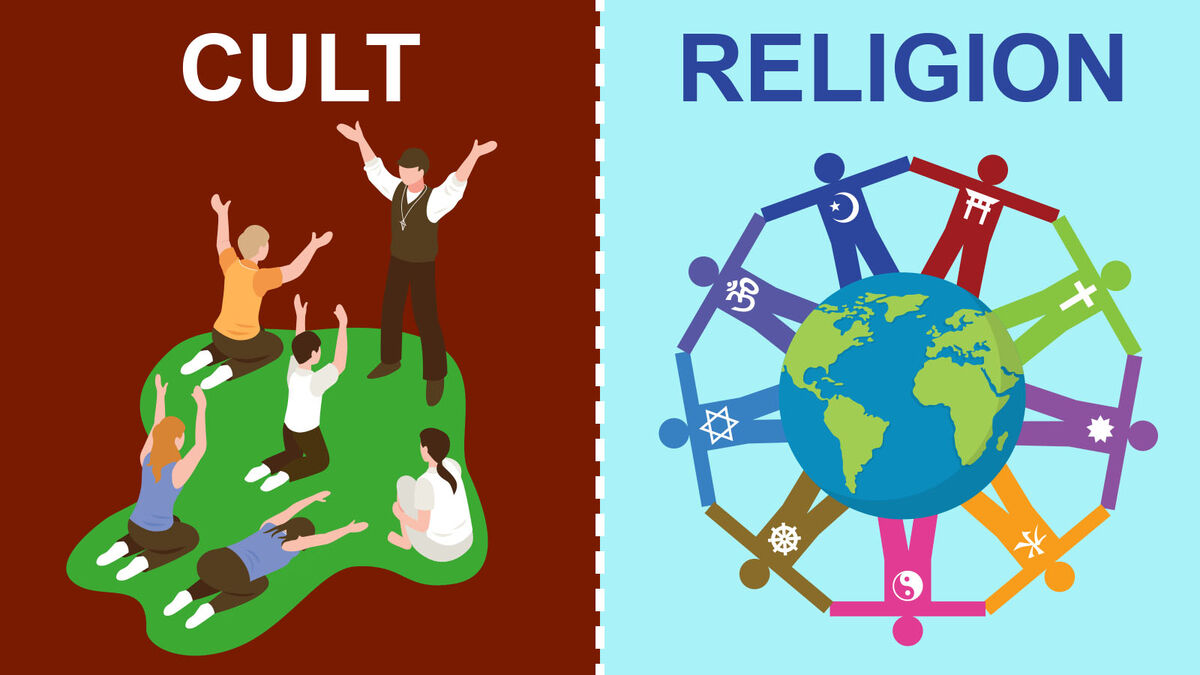
The differences between a cult and religion have changed throughout history making it difficult to identify what separates these groups. Discover modern and historical definitions and examples of cults and religions to see what makes them different.
What Is a Cult?
The common, modern definition of a cult is “a group of people with extreme dedication to a certain leader or set of beliefs that are often viewed as odd by others.”
General Characteristics of Modern Cults
While definitions of a cult can vary, these groups generally have a few common characteristics.
- They rush you into joining and discourage or disallow questions.
- Followers are encouraged to worship a specific group leader.
- Leaders dictate in great detail all aspects of followers’ lives.
- Followers are personally monitored to ensure they’re following guidelines.
- Methods of control are used to keep members close.
Examples of Cults
Exploring examples of cults can help you better understand what defines these groups. Famous cult organizations from recent history include:
- Jonestown: Due to legal and societal pressure, the group’s leader Jim Jones moved the group out of the U.S. where they eventually committed a mass suicide.
- Branch Davidians: What started as an offshoot of the Seventh Day Adventists ended in a government raid and deadly fire that killed leader David Koresh.
- Heaven’s Gate: This group was known as a doomsday cult and committed mass suicide, which they believed would gain them access to an alien spacecraft.
What Is a Religion?
One common definition of religion is “a set of beliefs about God or the supernatural.”
General Characteristics of Religions
Although each religion has different beliefs, there are some characteristics that group them as religions.
- The group worships a higher source of power rather than a single person.
- There is a shared, sincere belief system.
- The main belief or beliefs are consistent with basic mainstream standards for human dignity.
- Appropriate forms of conduct between people are defined.
- An understanding of evil is established, especially how it impacts humans.
- There are sacred ritual acts.
Examples of Religions
As of 2017, the U.S. Department of Defense recognized over 220 religions. According to the U.S. government’s policies on religious discrimination, traditional organized religions include:
- Buddhism
- Christianity
- Hinduism
- Islam
- Judaism
Main Differences Between Cult and Religion
The definitions and examples of cults and religions highlight some of their differences. The main differences can be summed up by six factors.
Original Meanings of Cult and Religion
The original use of the term cult was reserved for religious groups who showed high respect to a particular Saint, for example.
Longevity of the Group
Many experts, including Philosophy professor Sam Fleischacker, argue that the main difference here is that a religion has lasted for generations, namely more than 100 years. Cults, on the other hand, don’t last long because they self-destruct or engage in unhealthy practices that limit their membership over time.
A Cult Is a Social Movement
In the early 1900s, the term cult was pulled from the religious context and used in a sociological context. For sociologists, a cult described a group with beliefs and practices that were socially deviant. Today, cults don’t always deal with religious beliefs, but religions do.
Government Recognition
Religions are recognized and accepted by the government, but cults are not. In terms of law, there is no single, standard definition of religion. Different countries recognize different religions based on a variety of factors. Cults are not typically accepted by governments.
Public Opinion
Thanks to the media and a few extreme groups, the mainstream view of cults is negative. They are viewed as traps maintained by mind control whereas a religion is more dignified, structured, and acceptable.
Cult Can Be a Temporary Term
The term cult is often applied to controversial new religions or religious groups. However, if the group proves it can last over time and assimilate into the mainstream culture in some ways, it may not be called a cult anymore.
Groups Sharing Belief Systems
Cults and religions are both groups of people who share a belief system, but they do so in very different ways today. Think about the belief system you adhere to and examine it against these factors to see if it’s a cult or a religion.